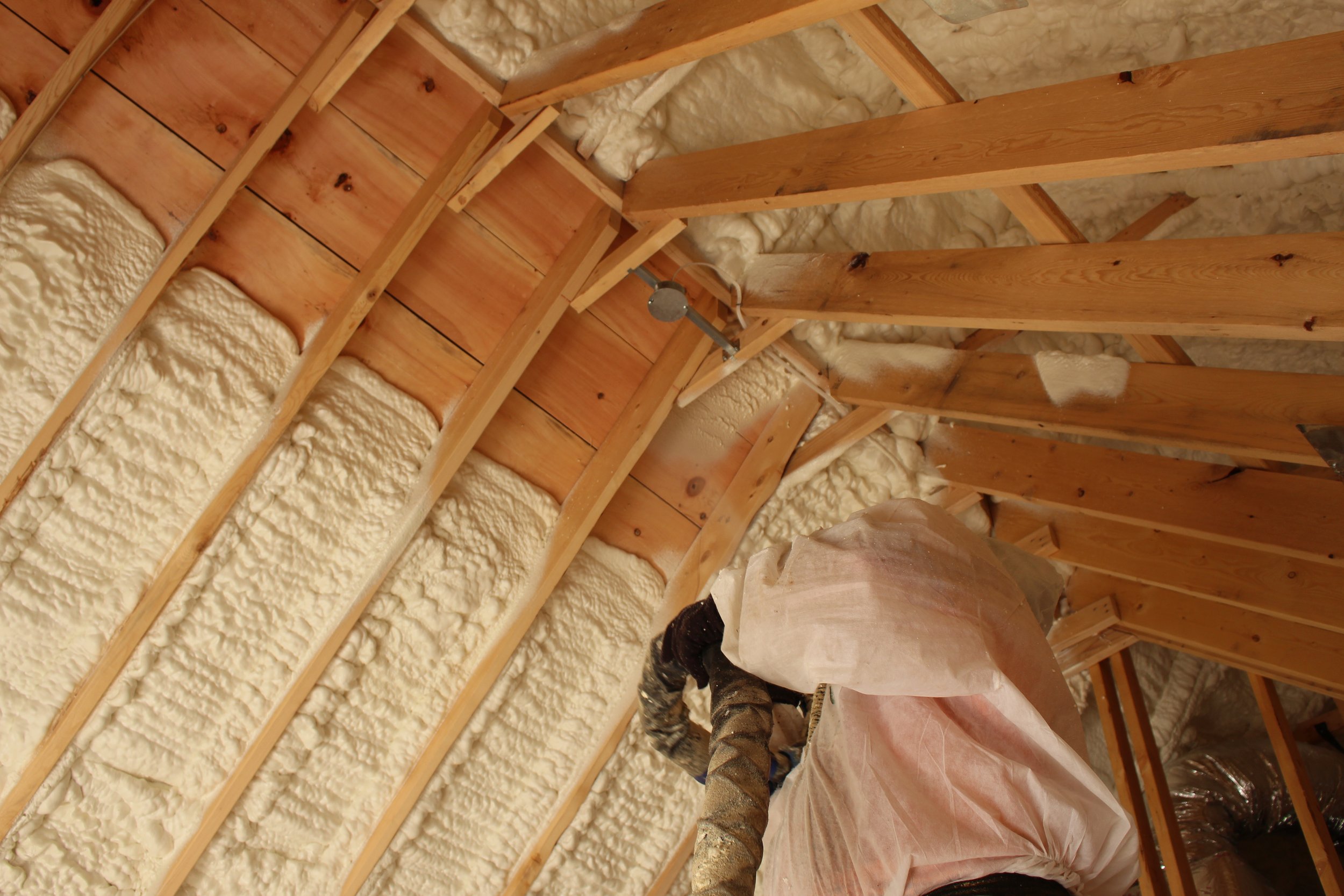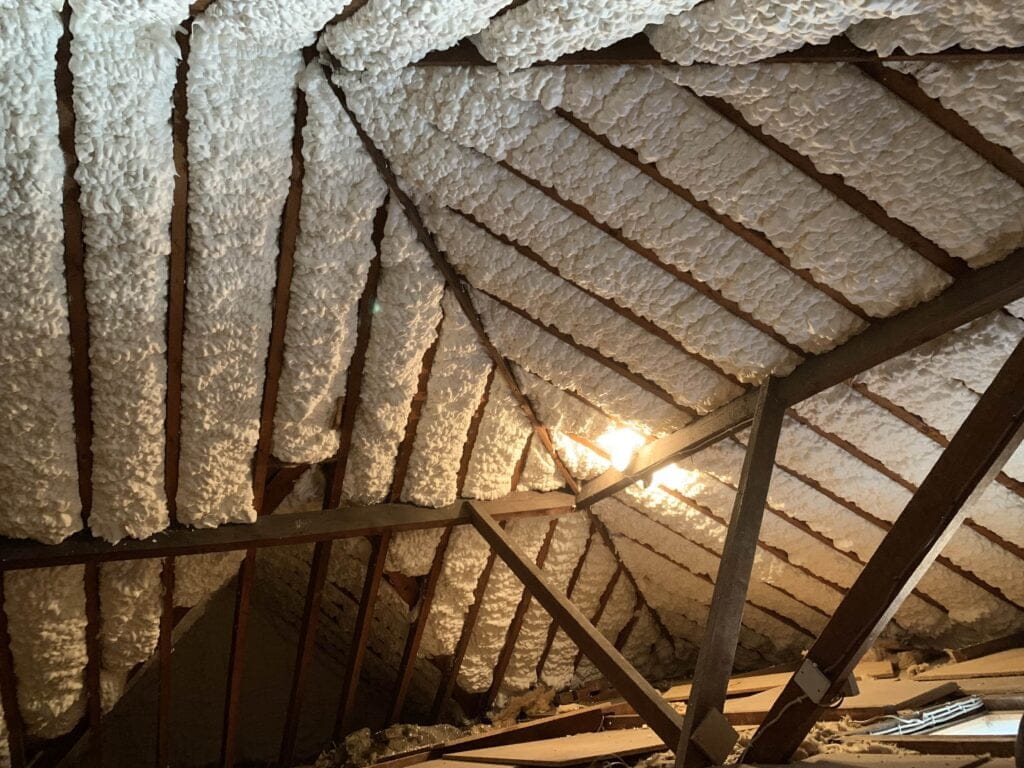Frequently Asked Questions About Spray Foam Installation and Use
Frequently Asked Questions About Spray Foam Installation and Use
Blog Article
Spray Foam: The Ultimate Option for Air Sealing and Insulation
Spray foam insulation has actually arised as a leading option for effective air securing and thermal insulation, providing a special combination of residential or commercial properties that set it apart from traditional methods. Its ability to increase and fill up spaces makes it especially effective in preventing air leakage, which can significantly impact power effectiveness. Recognizing the complete scope of its advantages, installation processes, and contrasts with various other insulation kinds is crucial for making informed decisions. As we check out these elements, the ramifications for both new constructions and retrofits come to be increasingly significant. What variables should affect your choice?
What Is Spray Foam?
Spray foam is a versatile insulation material that incorporates the principles of air sealing and thermal resistance to boost energy efficiency in structures. Made up mainly of polyurethane or other comparable substances, spray foam is used as a liquid that broadens upon contact with surfaces, developing a strong, continuous layer of insulation. This one-of-a-kind residential property allows it to fill gaps, cracks, and gaps that traditional insulation materials might neglect, offering an exceptional air seal.
There are 2 major kinds of spray foam: open-cell and closed-cell. Open-cell spray foam is lighter and much more adaptable, offering exceptional sound absorption and a lower R-value per inch - Spray Foam. In comparison, closed-cell spray foam is denser, supplying a higher R-value, moisture resistance, and included structural stability to constructing parts
The application procedure normally includes customized tools, guaranteeing a smooth application that abides by different substratums, consisting of wood, concrete, and steel. This flexibility makes spray foam ideal for both new building and constructions and retrofitting existing structures. Its ability to create an airtight obstacle significantly contributes to reducing power usage and enhancing interior air high quality, thus making it a preferred selection among contractors and house owners alike.
Advantages of Spray Foam Insulation
Among one of the most considerable benefits of spray foam insulation is its exceptional capacity to develop a constant air barrier, which effectively minimizes energy loss. Unlike traditional insulation products, spray foam expands to load voids and cracks, ensuring that air leak is considerably lowered. This particular not just improves power effectiveness yet additionally causes reduce utility expenses in time.
Additionally, spray foam insulation offers superior thermal resistance, adding to an extra secure interior setting. Its high R-value per inch permits for effective insulation in restricted rooms, making it perfect for attics, wall surfaces, and crawl spaces. Furthermore, the moisture-resistant buildings of spray foam aid stop mold and mildew development, advertising healthier living problems.
An additional essential advantage of spray foam insulation is its sound-dampening top qualities (Spray Foam). It properly decreases sound transmission in between areas, developing a quieter and more comfy home setting. The resilience of spray foam also attracts attention, as it does not droop or resolve in time, preserving its performance throughout its life expectancy
How Spray Foam Works
Recognizing how spray foam insulation works is vital for appreciating its efficiency in air sealing and thermal resistance. Spray foam insulation includes two main components: isocyanate and polyol resin. When these elements are blended, they go through a chemical response that causes the product to broaden rapidly, developing a thick foam that loads gaps, fractures, and dental caries.
As the foam expands, it complies with surfaces, forming an impermeable seal that dramatically reduces air infiltration. This characteristic makes spray foam insulation very reliable at protecting against drafts and moisture penetration, which can result in power loss and damages in time. In addition, the closed-cell version of spray foam provides remarkable thermal resistance due to its stiff framework, efficiently minimizing warmth transfer.
The one-of-a-kind homes of spray foam allow it to satisfy irregular surface areas, making certain comprehensive coverage and a smooth obstacle. Because of this, spray foam insulation not just improves energy effectiveness but also adds to improved indoor air quality by minimizing the build-up of irritants and contaminants. Inevitably, understanding the mechanics behind spray foam underscores its role as a remarkable selection for site here insulation and air sealing in both domestic and industrial applications.
Installment Refine Introduction

Before installment, the area needs to be effectively cleaned up and prepped, guaranteeing that surfaces are devoid of wetness, dust, and debris. Since pollutants can jeopardize bond and total efficiency, this action is vital. As soon as the area is prepared, the application includes mixing the two elements of the spray foam, which broadens upon contact and fills gaps effectively.
Trained specialists must perform the installation, using specific devices to make certain uniform insurance coverage and optimum thickness. Safety and security precautions, including wearing protective equipment and guaranteeing appropriate air flow, are imperative throughout this procedure. After application, the foam typically cures promptly, creating a strong obstacle that improves energy efficiency.
Contrasting Spray Foam to Typical Insulation
When assessing insulation options, spray foam insulation stands out in comparison to typical products such as fiberglass and cellulose. Unlike fiberglass and cellulose, which can allow air infiltration, spray foam increases upon application, filling crevices and gaps to develop an impermeable seal.
In addition, spray foam supplies a greater R-value per inch than standard insulation kinds, using more efficient thermal resistance in a thinner profile. This particular is particularly beneficial precede with limited tooth cavity deepness. Additionally, spray foam is resistant to moisture and mold and mildew growth, which can be a significant worry about cellulose and fiberglass, particularly in moist environments.
Nonetheless, spray foam insulation typically lugs a higher in advance cost than its standard equivalents. Home owners have to evaluate this preliminary investment versus long-lasting energy savings and efficiency advantages. Inevitably, while both insulation kinds offer their function, why not try these out spray foam arises as a more sophisticated solution for modern-day insulation requirements, particularly in regards to air sealing and thermal efficiency.

Final Thought
In recap, spray foam insulation represents a very reliable solution for achieving optimal air sealing and thermal resistance. Its unique properties, consisting of dampness resistance and audio dampening, make it ideal for numerous applications in both brand-new building and constructions and retrofitting projects (Spray Foam). The preliminary costs might be greater compared to traditional insulation products, the long-lasting benefits, such as substantial power savings and boosted interior air quality, warrant the financial investment and highlight its value in modern-day building practices.
Spray foam insulation has you could try here actually arised as a leading service for effective air sealing and thermal insulation, providing a special mix of residential or commercial properties that set it apart from typical methods.Spray foam is a flexible insulation material that combines the principles of air securing and thermal resistance to improve power performance in structures.When reviewing insulation alternatives, spray foam insulation stands out in contrast to traditional materials such as fiberglass and cellulose. Inevitably, while both insulation kinds serve their function, spray foam arises as a more sophisticated option for contemporary insulation requirements, especially in terms of air sealing and thermal effectiveness.
In recap, spray foam insulation represents a highly effective remedy for achieving optimal air sealing and thermal resistance.
Report this page